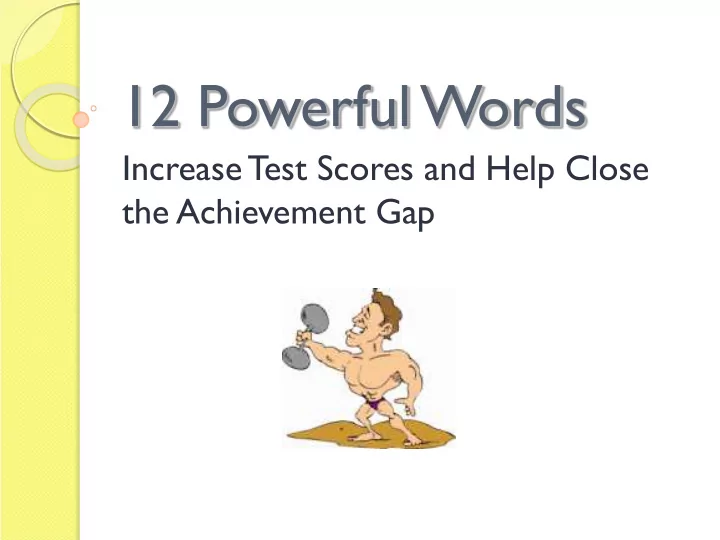

12 Powerful Words Increase T est Scores and Help Close the Achievement Gap
Objectives T eachers will familiarize themselves with the 12 Powerful words. T eachers will create assessment questions using the 12 powerful words.
12 Powerful Words Rap http://www.schooltube.com/video/7b917d 095d843e7c9224/
What do we mean by powerful words? These are the words that stump students when they take standardized tests. Students may feel intimidated or confused by these words causing them to answer a question incorrectly when they know the answer.
12 12 Po Power erful ful Wor ords ds Help all students: T o better understand what each question means T o become familiar with words that require higher order thinking skills T o relieve test anxiety T o achieve better on tests
What can you do as a teacher? Model these words in the classroom through questioning techniques. Ask students to use the words in their written responses. Include these words in classroom assignments to make students more familiar with them. Have students make up their own questions utilizing these words. Imbed direct instruction of these words on a regular basis.
Trace List in 1, 2, 3 order List in steps Sequence Example: Using the paragraph, trace the steps of cell mitosis.
Analyze Break apart Think through Break into pieces Look deep into it Example: Which of the following analyzes how the author used personification?
Infer Read between the lines Take what you know plus context clues What do you think? Example: After reading the speech, make an inference about why it was titled “ Ain ’ t I A Woman ” ?
Evaluate Judge its worth What’s good what’s bad Example: Evaluate the value of x in this equation.
Formulate Come up with Plan Create Construct Example: Formulate an opinion about this issue and express it in a short paragraph.
Describe T ell in your own words Who, What, When, Where, Why, How Example: Which of the following best describes the author’ s mood?
Support Back up with details T ell why How do you know? Give evidence Example: Which of the following sentences best supports the main idea.
Explain T ell how Who, What, When, Where, Why, How Example: Based on this paragraph, explain how viruses spread from one person to another.
Summarize Give me the short version Retell the key points Example: Which of the following best summarizes the story?
Compare How are they the same Alike Example: Compare the government of Great Britain to the government of the United States.
Contrast How are they different? Example: Contrast the government of the United States and Cuba.
Predict What will happen next What will happen in the future? Conclude Example: In a short paragraph, predict how the story will end.
Resources 12 Powerful Words (and quiz) 12 Powerful Words Flashcards 12 Powerful Words Flashcards 12 Powerful Words Printable Flashcards Larry Bell Presentation 12 Powerful Words Posters lms.lps.libguides.com/content.php?pid=278906&sid=2654014
Recommend
More recommend